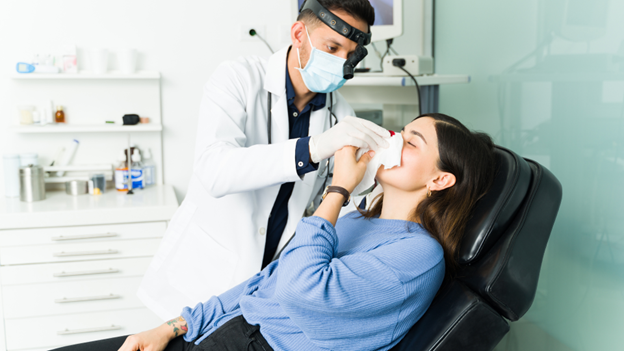
Stop that drip: how to stop a nosebleed fast
Nosebleeds can strike suddenly and catch us off guard. Dealing with a nosebleed can be unsettling, whether it’s caused by dry weather, allergies, or a bump in the face. But don't worry. In this guide, we'll equip you with the knowledge and techniques to stop a nosebleed fast.
Say goodbye to those inconvenient drips and hello to swift relief.
How to stop a nosebleed fast
A nosebleed may seem alarming, but with the right steps you can stop a nosebleed and get back to your daily routine. Follow these simple instructions.
- Stay calm. Keep your composure. Panic can make the situation worse.
- Find a comfortable position. Sit down and lean slightly forward to prevent blood from flowing down your throat.
- Pinch your nostrils. Use your thumb and index finger to pinch your nostrils just below the bony bridge of your nose. Apply steady pressure for 10-15 minutes.
- Breathe through your mouth. While pinching your nostrils, breathe through your mouth to ensure you're getting enough oxygen.
- Stay upright. After successfully stopping the nosebleed, remain in an upright position for a while to prevent the bleeding from starting again.
- Avoid certain actions. Refrain from activities that might irritate your nose, such as blowing your nose, picking at scabs, or heavy lifting.
- Keep your nostrils moist. To prevent future nosebleeds, use a saline nasal spray or apply a thin layer of petroleum jelly inside your nostrils to keep the nasal membranes moist.
Remember, if the bleeding persists for more than 30 minutes or if nosebleeds are frequent, seek medical attention to rule out any underlying medical conditions.
Nosebleed causes and triggers
Nosebleeds, while often harmless, can be unsettling. Understanding what causes them can help you prevent nosebleeds from happening in the future.
Here are some common causes and triggers of nosebleeds.
- Dry air. When there is not enough moisture in the air it can dry out the nasal blood vessels, making them more susceptible to bleeding. This is most common in arid climates or during the winter months.
- Nose picking or trauma. Nose picking or inserting foreign objects into the nose can damage blood vessels and lead to nosebleeds. Trauma from accidents or sports injuries can also trigger nosebleeds.
- Allergies. Seasonal allergies or sensitivity to airborne allergens can lead to frequent sneezing and nose-blowing, potentially causing irritation and nosebleeds.
- Sinus infections. Infections like sinusitis can inflame the nasal passages, increasing the risk of nosebleeds.
- Medications. Certain medications, such as blood thinners or nasal sprays, can raise the risk of nosebleeds.
- High blood pressure. Elevated blood pressure can strain the nasal blood vessels, potentially leading to nosebleeds. Managing hypertension can reduce this risk.
- Alcohol and tobacco use. Excessive alcohol consumption and smoking can weaken blood vessels, including those in the nose, increasing the likelihood of nosebleeds.
- Nasal irrigation. Overusing or improperly using nasal irrigation devices or saline sprays can irritate nasal passages and trigger nosebleeds.
- Underlying medical conditions. Certain medical conditions, like blood disorders, liver disease, or nasal tumors, can increase the risk of nosebleeds.
Nasal care: how to prevent nosebleeds
Preventing nosebleeds often comes down to maintaining the health and moisture of your nasal passages. We will share some simple yet helpful tips to help you steer clear of those inconvenient nosebleeds.
Here's how to keep your nose in tip-top shape.
- Humidify the air. Use a humidifier, especially in dry or cold climates, to maintain air moisture and prevent nasal dryness.
- Stay hydrated. Drink plenty of water to keep your mucous membranes moist and less prone to irritation.
- Use nasal saline sprays. Over-the-counter saline nasal sprays or gels will keep your nasal passages moisturized, particularly if you experience dryness.
- Avoid overusing decongestants. Only use nasal decongestant sprays as directed and for short periods to avoid rebound congestion and potential nosebleeds.
- Blow your nose gently. Avoiding excessive force, which can harm nasal blood vessels, whenever you have to blow your nose. Use soft tissues and blow one nostril at a time when possible.
- Manage allergies. Effectively manage allergies with antihistamines or other allergy medications to reduce sneezing and nose-blowing that can lead to nosebleeds.
- Monitor medications. If you're on medications that increase the risk of nosebleeds, consult your health care provider for potential adjustments or alternatives.
- Get regular check-ups. Visit your physician regularly to identify any underlying conditions contributing to the issue, especially if you have frequent or severe nosebleeds.
Remember, preventing nosebleeds is all about keeping your nasal passages happy and healthy. Whether it's using a humidifier, staying hydrated, or simply being gentle with your nose, these small steps can make a big difference.
If you are dealing with stubborn nosebleeds, don't hesitate to swing by your neighborhood CityMD location. Our team is always ready to lend a hand and offer the care you need. Just walk in. No appointment is needed.

We’re ready to care for you.
Visit any CityMD urgent care location in your community today for an evaluation with one of our expert providers.